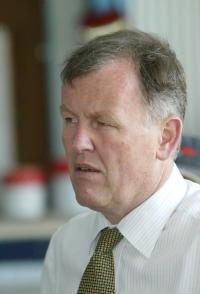Fees drive justice out of reach, says Hulls

Rob Hulls. Photo: Damian White
- David Rood
- June 10, 2008
BARRISTERS' high fees are putting justice out of reach of many Victorians, claims Attorney-General Rob Hulls.
Asking whether the court system was aimed at resolving disputes or increasing costs for those involved, Mr Hulls also suggested that the state's adversarial justice system might be past its use-by date. "The cost of justice, particularly when you have some barristers charging these days up to $14,000-plus a day … is becoming prohibitive," he said.
"It's becoming a fiefdom for large corporate entities to take action against each other in the full knowledge that their legal fees are tax deductible, and they have to realise publicly funded court time is not infinite."
The broadside comes as Mr Hulls, who is also Deputy Premier, prepares to release a blueprint for the state's legal system. He used comments to a recent parliamentary hearing to make the case for a major shift towards the resolution of civil disputes by mediation.
Despite embracing the mediation push, Victorian barristers immediately hit back at Mr Hulls, calling his comments gratuitous and unhelpful. In recent months, the Attorney-General has had a strained relationship with barristers, particularly about acting judges.
With last month's budget allocating almost $18 million for "alternative dispute resolution" programs, Mr Hulls said courts should be "a port of last resort". He called for more mediation outside the court system to help reduce legal costs.
"In court, it's often one side wins everything. The other side walks away thinking 'the system let me down'," he said.
Much of the dispute resolution would be based on a Canadian model that sends intractable disputes to a judge with no previous involvement in the case, with the aim of having it resolved.
The four-year budget funding includes $5.8 million for the Magistrates Court for mediation programs, as well as $3.7 million for judge-led resolution pilot programs for the Supreme and County courts.
As well as making judicial appointments, Mr Hulls has introduced numerous changes to the legal system including acting judges, drug and Koori courts, and the push towards dispute resolution.
The chairman of the Victorian Bar Council, Peter Riordan, SC, said the Attorney-General's attack was a misrepresentation and showed that he failed to understand how the Victorian court system had embraced mediation and the need for dispute resolution.
Mr Riordan said he was aware of one barrister who might be charging $14,000 a day, but the vast majority worked for a fraction of that rate and some earned $100 a day.
"If one barrister charges that, is it really relevant to talk about it? They are gratuitous comments that don't help the debate," he said.
Mr Riordan said that having judges decide cases was a final resort if a dispute could not be resolved in other ways, adding that every Victorian case was mediated at least once and most were resolved by agreement.
"Victoria's Court system is well past the day where it says, 'OK, you've got a dispute, we'll go to trial.' It pushes you constantly, like no other jurisdiction in the world, towards having every opportunity to mediate."
Getting judges more involved in the dispute resolution process was critical to improving the mediation system.
"Ninety per cent of cases that don't settle at mediation, don't settle because they don't have the right people there," Mr Riordan said.